|
The
theatre
|
Bourne affords scanty
encouragement to dramatic companies on tour. A company in the
early spring departed as depressed in spirit as they were low in
purse. A few weeks ago, another company was so absorbed in
histrionic studies that it left a memento of its visit in a few
forgotten accounts. And on Friday evening, a third company, with
an attractive programme and excellently recommended, opened their
doors to admit an audience of one. The performance on the
following evening was poorly patronised.
- news report from the Stamford Mercury, Friday 29th August 1890. |
This report suggests that the people of Bourne did not
take kindly to theatrical performances and there is other evidence from the
same source that travelling companies found the town far from being a
congenial venue. On Friday 17th March 1882, the Stamford Mercury
reported: "It is not often that a respectable dramatic company ventures to try
its fortune in Bourne but next week, Miss Fanny Pitt and her corps, who come
with a good reputation from Stamford, will test the taste of our townspeople
for the drama."
However, the company stayed for a week and the reception was
far better than expected because the newspaper subsequently reported on Friday
24th and 31st March:
Miss Fanny Pitt's Comedy Drama Company have been
performing at the Corn Exchange this week. On Monday, the comedy of The
Serious Family was given. On Tuesday, the celebrated drama East Lynne
was very effectively produced, the acting of Miss Pitt as Lady Isabel Carlyle
being particularly affecting and the whole of the characters being taken in a
very creditable manner. On Wednesday evening, Lytton's play of The
Lady of Lyons was performed. There was a good attendance each evening and
the representations appeared to give general satisfaction. There were further
performances on Thursday, Friday and Saturday evenings: the play of The
Woman from the People was admirably represented. On Friday, The Serious
Family was repeated by special request and was exceedingly well received;
the performance that evening concluding with the musical comedy Perfection,
in which songs were given by Miss Pitt and which elicited frequent and hearty
applause. On Saturday, The Ticket of Leave Man was put upon the stage
in a manner which conclusively proved the talent of the various performers.
A theatre opened
in Bourne at the beginning of the 19th century and was situated on the edge of the old cattle market site just off Abbey Road. A local newspaper advertisement of 1806 gives details of the forthcoming programme at The Theatre,
Bourne, where there were usually performances on four nights a week, beginning at 6.30 p m and the admission prices were 3s. 0d. for a box, 2s. 0d for the pit and 1s. 0d. for the gallery
[£1 being worth 20s. in those days of pre-decimal currency]. The theatre
required a licence granted by Act of Parliament to stage public
entertainment and the
Stamford Mercury reported that at the Kesteven Sessions held at the Town
Hall, Bourne, on 13th January 1829, "a licence was granted to Joseph Smedley,
comedian, to open his theatre at Bourne as usual".
The plays performed were mainly popular tragedies, comedies or farces although one item in the 1806 advertisement announced "The celebrated Musical Entertainment (never acted here) called Paul and Virginia" and after giving details of the various scenes, the notice promised "the whole to conclude with a storm at sea, shipwreck, etc etc."
The theatre continued in use throughout the century but by 1905, the building had been taken over by Lea and Green Ltd, manufacturers of aerated mineral waters, and
was known as The Old Theatre. The premises were subsequently used by W M Friend, agricultural engineers and machinery agents followed by the building merchants F W Davies and were finally demolished in 1989 to make way for the new market place and Corn Exchange development.
The closure of the theatre at the turn of the century however, did not end
professional theatrical performances in Bourne. After the First World War of
1914-18, a travelling company came twice a year and performed in a building
behind the Six Bells public house at No 35 North Street (now used for three
shops, Hoppers the Jewellers, Concept and Scissors), and their productions
included a dramatisation of Harriet Beecher Stowe's novel Uncle Tom's Cabin
and the Edwardian melodrama Maria Martin and the Murder in the Red Barn. The
prices for admission were 3d., and 6d, £1 being worth 240 pennies.
|
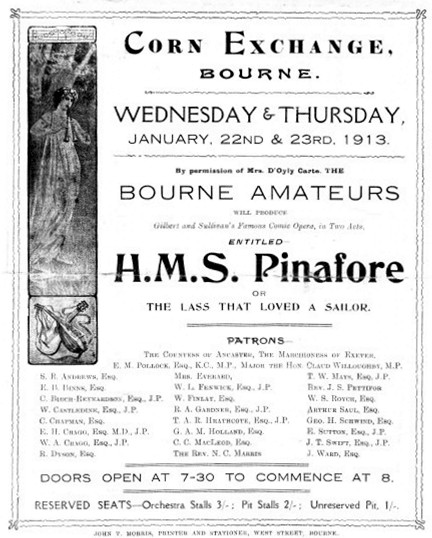 |
|
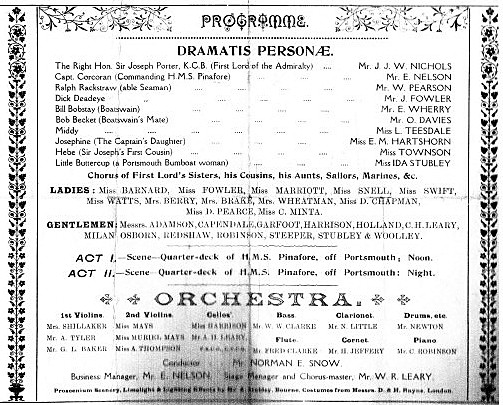 |
|
The programme from the first amateur operatic
production in 1913 when the company presented the Gilbert and Sullivan
operetta HMS Pinafore at the Corn Exchange in Bourne, still a popular
venue for amateur productions. Among the gentlemen of the chorus was
William Harold Redshaw, eldest son of the photographer William Redshaw, who was then aged 43, and is pictured right.
A later production is pictured below showing the cast of the Yeoman of the Guard,
also by Gilbert and Sullivan, which was presented by the
Bourne Amateur Operatic Society on 25th-27th January 1921 and below that the finale of the 1932 production of The Balkan Princess. |
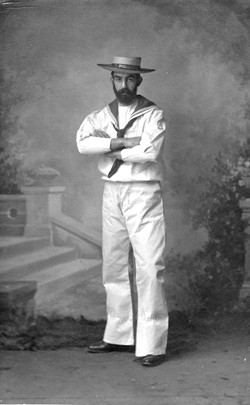 |
|
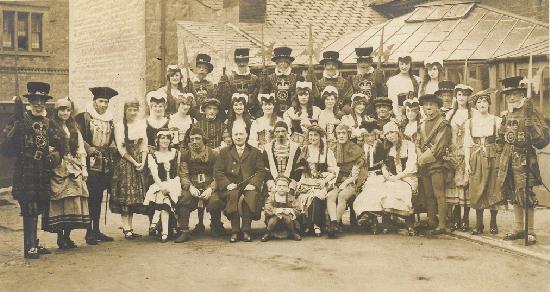 |
|
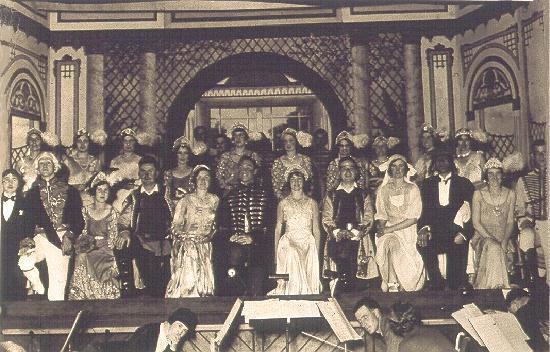 |
There was also a lively interest in the musical theatre and
the Bourne Amateur Operatic Society performed from 1913 until 1936, presenting a series of shows at the Corn Exchange that became the highlight of the year for the town. In
1914, their production was Gilbert and Sullivan's Pirates of Penzance when the cast included Mr Wallis, the local sergeant of police, Miss Hartshorn, a teacher at the Abbey Road Primary School and Mr Nichols, a baker in South Street.
The production in 1931 was The Street Singer when the Stamford
Mercury reported on the popularity of the company: "For years now it has
been an accepted fact that the Bourne Amateur Operatic Society give one of the
best entertainments of the year. Its members are nothing if not versatile and
when the curtain rang down at the close of Tuesday's show, everyone was agreed
that the players had lived up to their reputation."
This success was repeated
the following year when, in
November 1932, they presented The Balkan Princess with a similarly varied cast of townspeople.
Among the active members of the society was the motor racing pioneer Raymond Mays who lived in Eastgate and was a passionate devotee of the theatre, appearing in several local
productions, and Basil Boothroyd, a young bank clerk in Bourne who was to become a distinguished writer and broadcaster and
assistant editor of the humorous magazine Punch.
|
Raymond
Mays is pictured here in a production of The Quaker Girl by the Bourne Amateur
Operatic Society in 1930, on stage with two of the society's
stalwarts, Win Hassock and Kath Hinson.
His love of the theatre
was second only to his love of motor racing but, said Kath:
"He could neither act nor sing that well but my goodness he
certainly looked good on stage." Dancing was another matter
and among Ray's hundreds of motor racing trophies was one for
winning a competition for dancing the foxtrot.
See also
Raymond
Mays
|
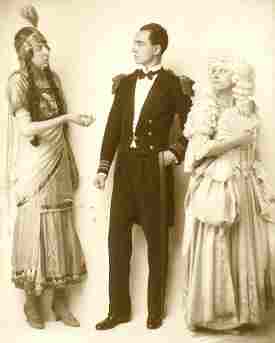 |
|
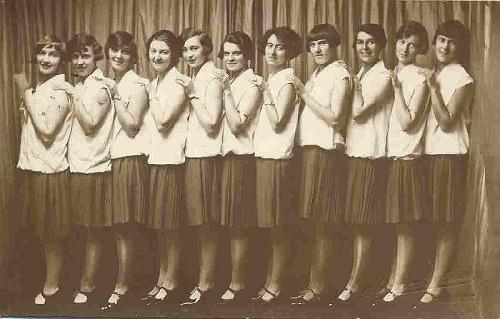 |
|
The chorus line from The Quaker Girl in
1930: F Dodd, T Burchnall, A Smith,
W Collins, Marie Stafford, F Brown, M Pulford, E Carter, Olive
Walker,
Marjorie Stafford and W Hodson.
|
The town currently has two amateur groups presenting annual shows, the Bourne Players and the Bourne Footlights, both companies using the Corn Exchange.
The Bourne Players have the longer pedigree, having been formed in 1937, and their
plays during the early years included One Wild Oat and Quiet Weekend and a more ambitious production was staged during the war years in November 1943 when they presented the three-act Laburnum Grove by J B Priestley. The company continued after the war but with more vigour
and with Mr Ernest Pattison, who had been the original founder, as the sole producer
from 1947 until 1975. During this period the company was successful in winning awards with one-act plays at the Kesteven Drama festival and other competitions at Scunthorpe and Skegness.
The first full-length play to be presented was When We Are Married by J B Priestley in 1959 and from then on, productions continued each year, sometimes twice, until the present day.
|
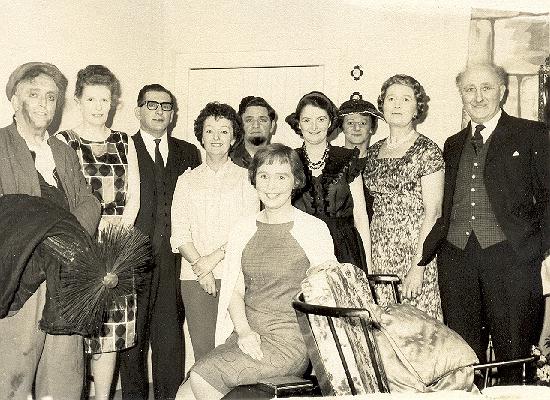 |
|
In 1965, Bourne Players presented Brush with a Body
by Maurice McLoughlin at the Corn Exchange on Wednesday 24th March
(admission by programme 3s. 6d.). The cast, pictured above, were John
Ward, Beryl Woods, William Waters, Diana Vaughan, Ron Baker, Mary Lyle,
Mary Wand, Gwyneth Pope and (centre front) Margaret Knowles. Ernest
Pattison, the producer, is on the right, |
Mr Pattison, who was the driving force behind the company for almost 30 years, did not hold auditions but was an astute spotter of talent with the knack of placing the right people in the appropriate parts, often when they had little or no acting experience and the results were usually extremely successful. Rehearsals were held in a variety of places, a room at the town hall, the Bourne Institute in West Road, the Bourne Laundry or in the homes of the various players while performances were dignified occasions with lady and gentlemen ushers wearing evening dress and interval teas served either by members of the Women's Institute or the Red Cross.
Prior to the annual performance, usually around Easter time, the cast would use the open spaces of the cattle market behind the Corn Exchange to clean and colour wash their flats or backdrops that had been in storage for the past year in readiness for the opening night while furniture and other props needed for the play would be borrowed from local
shops or even from Tom Jones, the antiques dealer in North Road, who was always willing to help. The stage footlights in the early days were specially made for the Bourne Players by Ray Marsh and later, overhead and spot lights were hired from the Lincolnshire County Drama Department and collected from either Sleaford or Grantham prior to each production. Eventually, the company purchased its own overhead lighting that was installed permanently in the Corn Exchange.
There was always a dress rehearsal on Monday evenings and performances started on Tuesday when senior citizens were given free seats but the highlight of the week was the attendance of the civic party, the chairman and members of the Bourne Urban District Council, usually on the final Saturday night.
Productions continued once and sometimes twice a year and although Mr Pattison retired in 1975, the company agreed to carry on with a new committee and constitution and continues to the present day, usually in the Corn Exchange although shows have also been staged in the Darby and Joan Hall and the Robert Manning Technical College. Over the years, three couples have met and married within the society, one member went into the ministry, two couples emigrated to Australia and others have moved to live elsewhere but the group continues to give pleasure to the people of Bourne every
year. In October 2002, the company celebrated their 65th anniversary with an
hilarious female production of Neil Simon's hit play The Odd Couple, directed
by Margaret Porter, the company's longest serving member with more than 25
years' experience.
In 2004, Bourne Players received an award for the Best Drama
Production from the National Operatic and Dramatic Association for their
production of Straight and Narrow by Jimmy Chinn which was performed at the
Corn Exchange, Bourne. The production then went on to win Best Back Stage Crew
and Best Actor at the Skegness Festival. Then, in 2007, the company won a
second award from NODA for the Best Drama Production 2006 for its production
of Ghost Writer by David Tristam which was again performed at the Corn
Exchange.
A second amateur company, Bourne Footlights, was formed in 1991
when their first presentation was a play called Living Together by Alan
Ayckbourn and directed by Maureen Berkes which was staged for three nights in
February and March that year. The company is still going strong 24 years later
with a comedy called Sandcastles by Bob Larbey and directed by Martin Tyrrell
which is due to be staged in November 2015.
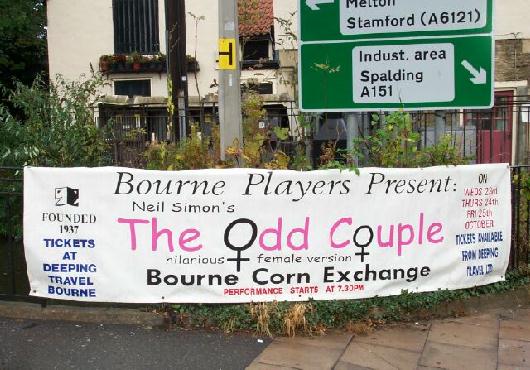
Advertising banner in South Street for the
65th anniversary production
by Bourne Players
|
The
Bourne Amateur Operatic Society presented the musical comedy The
Dancing Mistress in the autumn of 1929. There were shows in
the Corn Exchanges at both Bourne and Spalding and on November
13th, the Lincolnshire Free Press carried the following
news item accompanying a report of the two shows under the
headline: Bourne Amateurs shine in "The Dancing
Mistress":
A
Critic’s Impressions
The
Corn Exchange was filled to capacity when the Bourne Amateur
Operatic Society presented the first performance of The Dancing
Mistress on Friday, and there was also an excellent audience on
Saturday evening. Produced entirely without professional
assistance, the play was an excellent commencement.
Mrs
Ida E Pick, who played the name part, and who is also the hon.
stage manager, told the Free Press that they had been
rehearsing since August on nearly every evening in the week. All
the ladies’ dresses in the first act and most of those in the
last act were made or provided by the players. At the fall of the
curtain, after the last act, Mrs Pick was presented with a
beautiful bouquet. Other gifts were in small packages and the
recipients of these were Mrs Pick, Mr Reginald Sones (The Prince),
Miss Marjorie Stafford and Miss Marie Stafford.
The
general impression among the players was that the show had been
received very well and they thought the presentation was much
better than that of previous shows, though the latter were
doubtless more popular. Mr M Stirling MacKinlay, who is one of the
critics of the National Amateur Operatic Association and is a
well-known producer, afterwards addressed the players on the stage
and gave them some excellent and helpful advice. He congratulated
them upon their intonations, which he said, had been quite correct
throughout the evening. It was a smooth show, and the words were
very distinct in the dialogue. It was scarcely appropriate for
ladies to allow young men to offer them their heart while wearing
wedding rings, but that was a minor point.
Mr
MacKinlay also spoke of the difficulty of getting snow effects
without casting a shadow on the on the rear curtain. As produced,
however, they were good and very charming though he would have
preferred a gradual change in the lighting instead of the sudden
transitions. He had seen a similar thing at a London theatre, so
they were in good company. Their stagecraft was excellent and
there was no moving about with the wrong foot or getting in front
of each other. This was a frequent defect in the competitions last
year. He was glad they had gone into the competition. It showed
keenness. He had pointed out some of the minor imperfections and
he would write the good things later. It was no use coming from a
distance merely to say the nicest things. (Laughter). The whole
show had gone very well.
In
an interview with the “Free Press,” Mr MacKinlay agreed that
the minor imperfections rather emphasised the general excellence.
Our
own view is that it was difficult to realise that the players were
amateurs. The presentation was excellent and showed a painstaking
attention to detail. The slight catch in a world famous singer’s
voice only emphasises the beauty of the song; the trickling of the
mountain stream at midnight only emphasises the silence, and if
the slight imperfections in the performance had not been there,
the sense of intimacy and personal touch with the audience might
not have been accomplished. |
|
PRODUCTIONS BY THE BOURNE AMATEUR OPERATIC SOCIETY |
1913 HMS Pinafore
1914 The Pirates of of Penzance
1920 The Gondoliers
1921 The Yeomen of the Guard
1922 Miss Hook of Holland
1924 The Cingalee
1929 The Dancing Mistress
1930 The Quaker Girl |
1931 The Street Singer
1932 The Balkan Princess
1933 San Toy
1933 No! No! Nanette
1934 Sally
1935 The Girl Friend
1936 The Golden Moth
|
|
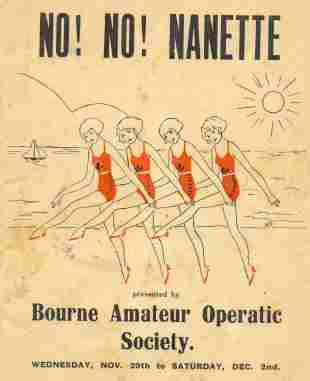 |
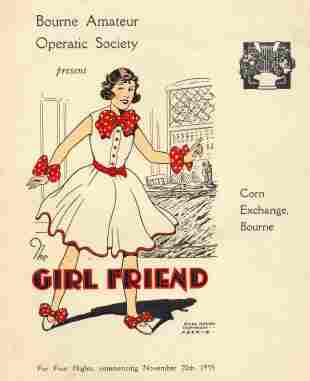 |
|
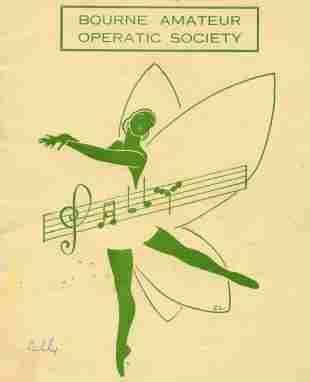 |
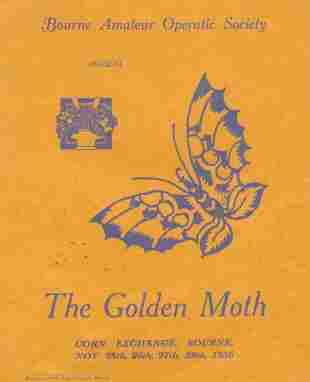 |
REVISED AUGUST 2015
See also
Ida Pick

Go to:
Main Index Villages
Index
|












